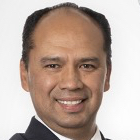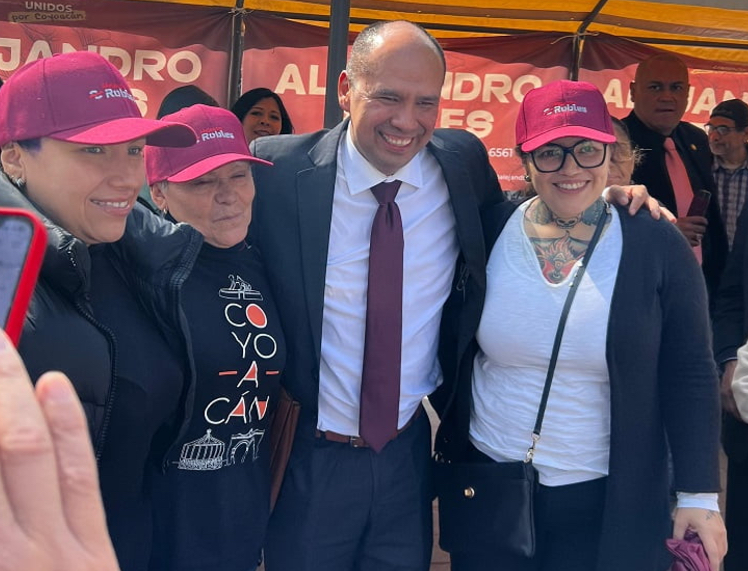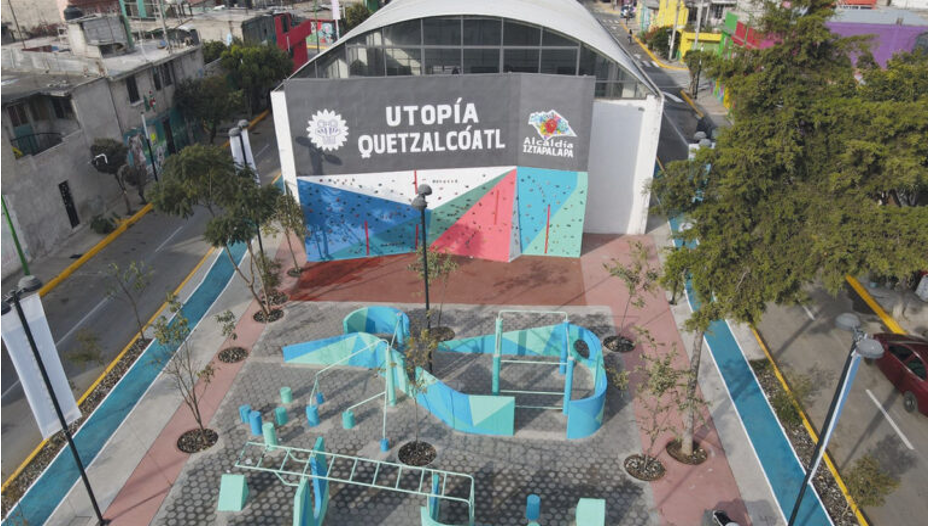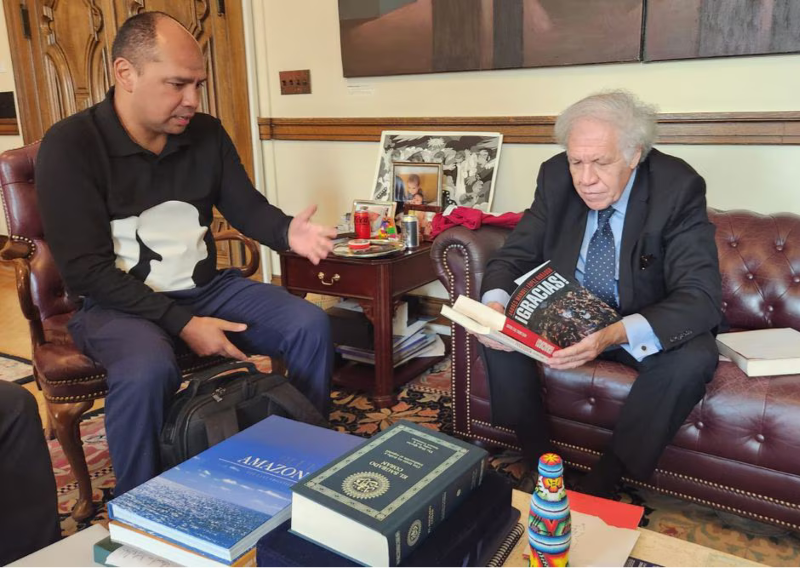|
|
|
|
The weekly newsletter of the Mexico Solidarity Project |
|
Every issue archived online at mexicosolidarityproject.org |
|
|
|
April 24, 2024/ Meizhu Lui, for the editorial team |
|
|
|
Circles not Lines: Mexican Migration |
|
|
Mexican-American DSA member, Democrat, and now US representative Greg Casar celebrates his primary election win in Austin, Texas, on March 1, 2022. Photo: Montinique Monroe/Getty Images |
|
When we think of Mexican migrants, we think of farm laborers leaving home after displacement from the dirt they tilled and, without land, becoming truly "dirt poor." We often assume that such migrants want a one-way ticket out of Mexico.
While that may be true for some, many others have a different story. Alejandro Robles, who lives in both Canada and Mexico, reminds us that migration is usually circular — it’s people coming and going, keeping a foot in each country.
What migrants earn also circles between both countries. Working in a wide variety of jobs in their new residence — as farmworkers, hotel and restaurant service workers, consulate staff, entrepreneurs, professors, and more — they contribute labor and taxes to the countries they migrate to. Their earnings go back to Mexico in billions of dollars in the form of remittances.
Migrants are also a political boon to both countries. Abroad, naturalized Mexicans and their children have been social movement activists and political players, making life better for everyone.
And often migrants engage in Mexican politics as well. Voters elected Alejandro Robles, even while he’s living in Canada, to represent his Mexico City home district in Mexico’s congress. He intends to help transform Mexico into a country whose people live and work in security, and he’s proposing policies that improve life for Mexicans who straddle two countries.
For all of us who believe that people should enjoy both freedom of movement between countries and the right to remain home, Robles and others like him will make out-migration a choice, not a necessity. |
|
For a deeper dive into current news and analysis in English, check out our media website. And definitely see the new English podcast ¡Soberanía! (Sovereignty) with José Luis Granados Ceja and Kurt Hackbarth. They entertain, while dismantling the lies and distortions about Mexico fed to us by the mainstream media. |
|
Don’t miss an issue! Sign up for a free Mexico Solidarity Bulletin subscription. |
|
|
A Migrant AND a Mexican Representative! |
|
|
The municipality of Coyoacán in Mexico City is Alejandro Robles Gómez’s home base, but he has lived for some time in Canada. His activist roots go back to the student strikes at UNAM (National Autonomous University of Mexico) in 1999/2000, where students resisted a massive tuition hike. In 2006, he began his political service as a representative in the national Congress and has served in various other political positions. Since 2021, as a Morena representative in Congress, he has been a strong advocate for human rights, migrant rights, and uplifting the poor. |
|
As someone living in Toronto, how did you become a Mexican Congressperson (Diputado)? |
|
|
Deputy Alejandro Robles with supporters |
|
Morena has reformed Congress to make it the most inclusive in the world, with affirmative action for five traditionally disenfranchised groups: Indigenous, disabled, Afro-descendants, LBGTQ+, and migrants living abroad. I don’t represent migrants in particular; in fact, we diputados/as from abroad are elected by the Mexican people residing in the place we come from. My base is Coyoacán, a municipality in Mexico City. But since my family lives abroad, naturally I specialize in immigration issues. |
|
In the past, people leaving Mexico were sometimes called traitors, but now we call them heroes and heroines. Their remittances of millions of pesos sent home to Mexico are recognized as a major contribution to the Mexican economy.
Immigration is a major issue in US elections. Most US politicians want migrants to “stay in Mexico.” What solutions do you propose?
AMLO has made clear that the burden of a US problem should not be put on Mexico’s back.
Migration is a bilateral issue that involves workers’ rights within the context of trade; we need a renegotiation of the USMCA’s Chapter 23 on labor. First, both countries should provide work permits to migrants. For the US, instead of relying on detention, which requires many facilities, and deportation, which requires a huge police and military effort, the US should recognize that most migrants have people in the US to live with and are willing and able to work. Jobs are available in Mexico, too.
Secondly, the five million undocumented workers in the US, especially in the agricultural sector, are the most insecure and therefore most exploited group of US workers. They need social security numbers and the same labor rights as citizen workers. If these workers are allowed to unionize, the migrant situation will improve on both sides of the border. |
|
In Mexico, the National Institute of Migration is supposed to provide guidance and support, but it’s been corrupt and ineffective. My proposal to Congress is that we create a new Ministry of Migration and Human Mobility using human rights principles. It would guarantee migrant safety and provide services to those either staying or passing through. The treatment of Haitian migrants is especially upsetting. Mexico has not provided adequate support; they’re more poorly treated than migrants from other countries, and many are sleeping in the streets. These are our brothers and sisters, and we must tackle our own society’s racism. |
|
|
A Haitian mother feeds her baby outside their tent in Ciudad Acuña. Toya Sarno Jordan for NPR |
|
You have a background in human rights. But have AMLO and Morena turned a blind eye to the families of the disappeared?
What is different today from past PRI and PAN administrations is the government’s willingness to speak the truth. Before, the government denied the existence of femicides. Today, we talk openly about structural violence against women. While it may appear that femicides haven’t decreased, better data now reflects our recognition that this is a distinct category, and we now track them as such. Similarly, with the disappeared we have greater transparency and the resolve to investigate government collusion with cartels.
Still, it’s true we’ve found far too few missing people and tried and convicted far too few of those responsible. We’re just beginning.
Do you agree that Mexicans living abroad are not getting help from Mexican consulates?
Under the old administrations, the consuls only interacted with the officials of the foreign government where they were stationed, not with their constituents. Consuls were appointed by the president; he’d send a name to the Senate, and that person was automatically ratified. |
|
|
Isabel Valades and her daughter Jacquelin, at the Mexican Consulate in Little Rock, Ark. Photo: Michael Stravato for The NY Times |
|
The consulates need to be transformed into defenders of migrants. I propose the direct election of the consuls. The President would nominate three people from the area of each consulate (53 are located in the US). The people of that area would vote their choice, and the winner would be presented for ratification. In addition, people who already live close by would be hired to work in the consulates. They know the people best, and since they already live there, it is cheaper than sending people from Mexico — you know the difference between the peso and the dollar! |
|
Your district is in Mexico City. Do you think that the opposition knows it will lose the presidency, and thus are pulling out the stops to win the race for mayor of Mexico City?
Xóchitl Gálvez wasn’t nominated for president because the opposition thought she could win, but because she could unify the PRI and PAN. They’re thinking ahead to 2030. If their candidate for mayor of Mexico City, Santiago Taboada, wins, his victory could be a springboard for him to regain the presidency for the old regime. |
|
Taboada and Morena’s candidate, Clara Brugada, are opposites in every way. Taboada represents Benito Juarez municipality, the most conservative district in Mexico City. He’s white, rich, and young. Morena’s candidate, Clara Brugada, represents the poorest municipality, Ixtapalapa. What she has done there is incredible, creating areas that are called “utopias.” Those who once literally lived on a garbage dump now live in safety with good transportation, free services, and recreational activities for women and young people. |
|
|
Utopia Quetzalcoatl opens it's doors in Iztapalapa |
|
Recently, Xóchitl Gálvez traveled abroad and asked Luis Almagro, Secretary General of the OAS, to intervene in the upcoming Mexican presidential election to ensure that it’s fair. You had your own chance to talk to Almagro. What did you say? |
|
For Xóchitl to ask for foreign intervention in our elections is shameful and disloyal; it goes against Mexican sovereignty!
I told Almagro that we don’t need his intervention. In OAS countries like Argentina and El Salvador, human rights violations are obvious — he should put his nose under those tents, not ours! |
|
|
Alejandro Robles and Luis Almagro, Photo: Especial |
|
Our electoral commission is independent; recently, it asked AMLO to stop talking about the opposition in certain ways — and he obeyed. There is no risk that the current government will meddle in the June election. And it’s already clear that Claudia Sheinbaum will be our next president. I’m proud and excited to take part in the second stage of the 4th Transformation. |
|
|
|
|
Mexico Can Blunt Trump’s Ethnic Cleansing |
|
|
Bill Gallegos, a veteran Chicano liberation activist, environmental justice leader, and revolutionary socialist, has a lot to howl about. |
|
|
US presidential candidate Donald Trump made the demonization of Mexicans and immigrants a central part of his 2016 presidential campaign and has doubled down in his current campaign for the presidency. If elected, he will unleash an ethnic cleansing campaign directed against the 12 million undocumented immigrants in the US.
Let’s understand what such a shocking pogrom would mean in real life:
In threatening this fascistic ethnic cleansing campaign, Trump is hoping to catapult himself into the White House with the support of white voters who want white minority rule — those who rabidly agree with Trump’s statement that immigrants from Mexico and the Global South are “diluting the blood” of the US population.
While the opposition to this threat must mainly come from US social movements and allies, Mexico also plays an important role in our efforts to secure full human and civil rights for all immigrants in the US. AMLO and the Mexican government can make clear to Trump their refusal to cooperate in this ethnic cleansing campaign, and that Mexico will not accept any of the “deportados” residing in US concentration camps. And Mexico can also encourage the governments of other likely affected countries, such as El Salvador, Honduras, and even China, to also refuse cooperation in such a monstrous violation of human rights.
Faced with the threat from Trump and his New Confederacy social movement, it’s essential to build solidarity among the Chicano Liberation struggle and other US social movements, especially labor and social movements in Mexico, and the progressive Morena government led by AMLO. There is no time to waste. We must act now!
Sí Se Puede! |
|
|
|
|
Recent news reports and commentaries, from progressive and mainstream media, on life and struggles on both sides of the US-Mexico border. Compiled by Jay Watts. |
|
Mexico Asks ICJ to Suspend Ecuador from UN if Its Government Does Not Apologize for Invading Mexican Embassy Orinoco Tribune. “What Mexico is doing by instructions of the president, is putting to test the multilateral system,” said Bárcena. She added that the world is experiencing serious violations of international law and that is why Mexico wants to set a precedent with this lawsuit against the government of Daniel Noboa.
Napoleón Gómez Urrutia, Urge compromiso político para fortalecer la libertad sindical La Jornada. La situación destaca la necesidad de una mayor atención a estas omisiones de las autoridades laborales del país. No debemos conformarnos con que las decisiones y el pleno cumplimiento de los derechos laborales sean impulsados desde fuera, como lo evidencia la reciente solicitud del gobierno de Estados Unidos para revisar las presuntas violaciones por Peñoles.
Amid U.S. And Industry Pressure, Mexico Delays Glyphosate Ban PANNA. Why would Mexico suddenly delay the glyphosate ban that was set to go into effect on April 1st 2024? Shamefully, that’s thanks to relentless pressure from the pesticide industry and the United States government.
Empleados del PRD toman la dirigencia nacional en protesta por falta de pagos El Soberano. Esta situación evidencia una vez más las tensiones internas y la fragilidad financiera que enfrenta el PRD. Los empleados, al sentirse desamparados y sin respuesta a sus demandas, han decidido tomar acciones directas para visibilizar su situación y exigir una solución pronta y justa a sus problemas laborales.
Diego Oré, Mexico, facing US pressure, will halt incentives to Chinese EV makers Reuters. The US is determined to ensure that Mexican economic development happens on its terms and for its benefit.
Roberto Morales, La Casa Blanca propone 45 millones de dólares para oficina laboral en México El Economista. Al igual que con la Guerra contra las Drogas, ¿Estados Unidos está presionando una vez más para violar la soberanía mexicana bajo el pretexto del avance social?
Rick Holmes, 'Slap in the face': Union criticizes company's decision to build some Mack trucks in Mexico WFMZ. The leadership of UAW Local 677 is calling Volvo’s decision to build a new heavy-duty truck manufacturing plant in Mexico "a slap in the face."
José Díaz Briseño, Buscaría revisión de T-MEC triangulación de China vía México El Diario. Al participar en un foro este lunes en el Atlantic Council en Washington, el Secretario de Hacienda mexicano aseguró estar receptivo a atender una potencial triangulación comercial de China vía México reconociendo que EU le expresara directamente su preocupación por la actual balanza comercial entre México y China.
Maya Averbuch, Carolina Millan, and Andrea Navarro, Mexico’s Presidential Frontrunner Sheinbaum Discusses Trump, Migration Bloomberg. Mexico's presidential frontrunner Claudia Sheinbaum is confident she'll have a good relationship with Donald Trump should they both win.
Héctor Alejandro Quintanar, Crisis de la intelectualidad en el neoliberalismo Sentido Común. En México no hubo dictadura de guerra fría, pero el programa neoliberal —producto acabado del mundo bipolar— se enquistó luego de una elección sin competencia democrática, para afianzarse en un abierto golpe fraudulento. |
|
|
|
|
The Mexico Solidarity Project brings together activists from various socialist and left organizations and individuals committed to worker and global justice. We see the 2018 election of Andrés Manuel López Obrador as president of Mexico as a watershed moment. AMLO and his progressive Morena party aim to end generations of corruption, impoverishment, and subservience to US interests. Our Project supports not just Morena, but all Mexicans struggling for basic rights, and opposes US efforts to undermine organizing and Mexico’s national sovereignty.
Editorial committee: Meizhu Lui, Bruce Hobson, Agatha Hinman, Victoria Hamlin, Courtney Childs, Susan Weiss. To give feedback or get involved yourself, please email us! |
|
Subscribe! Get the Mexico Solidarity Bulletin in your email box every week. |
|
Web page and application support for the Mexico Solidarity Project from NOVA Web Development, a democratically run, worker-owned and operated cooperative focused on developing free software tools for progressive organizations. |













